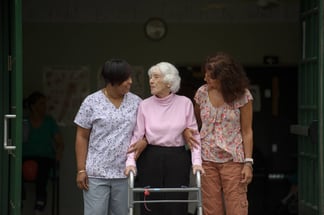 Occupational therapists offer valuable treatment for increasing independence and productivity, whether an older adult is affected by illness, experiencing memory loss, or has sustained an injury.
Occupational therapists offer valuable treatment for increasing independence and productivity, whether an older adult is affected by illness, experiencing memory loss, or has sustained an injury.
Here are five ways these trained healthcare professionals can promote a better quality of life for your aging loved one.
1. Managing Everyday Challenges
As our bodies age, typical daily activities often become more difficult. Occupational therapy ("OT") gives seniors tools for overcoming these challenges and continuing with their usual routines, including basic dressing and hygiene to routine domestic tasks.
Treatment may include range of motion and strengthening exercises, wound and skin care, functional ergonomics, and more. Occupational therapists can also help seniors struggling with cognitive decline and memory loss.
2. Modifications to the Home
A number of adaptive technologies exist which can make the home environment safer and more manageable for aging adults. An occupational therapist will assess your loved one's home and make suggestions designed to help ensure the continuance of usual daily activities. From bathtub benches to hand rails to easy grip silverware, there are hundreds of ways to enhance your loved one’s ability to thrive at home.
3. Fall Prevention
According to the Centers for Disease Control and Prevention, a full third of adults over the age of 65 fall every year. Even worse? Falls are the leading cause of injuries -- both fatal and nonfatal -- for seniors. In total, more than 2.5 million seniors are treated every year for falls, and 734,000 of them are hospitalized. Occupational therapists work with older adults to help them build strength and stay active -- both of which are critical to avoiding potentially debilitating falls.
4. Better Overall Wellness
Isolation and depression are common among seniors. Whether your loved one suffers from a psychiatric disorder or could simply benefit from regular interaction, occupational therapists are trained to educate seniors about how to live fuller lives. This is known to have an important impact on mental health and overall life satisfaction.
5. Caregiver Support
Occupational therapists don’t just assist their patients, but they also provide support to relatives and caregivers. As families care for their aging loved ones, occupational therapists can be valuable resources and advocates throughout decision-making processes and transitions. Their efforts can also lighten the load of overburdened caregivers by promoting self-reliance and increased independence among seniors.
Key Takeaways
- Although your aging loved one’s capabilities may be changing, he/she can still enjoy a full, satisfying life.
- Occupational therapists offer care plans designed to educate seniors and improve functional independence across a broad range of activities and behaviors.
- While occupational therapists help seniors overcome a number of physical, mental and/or psychological challenges, they also provide essential support services to caregivers.

